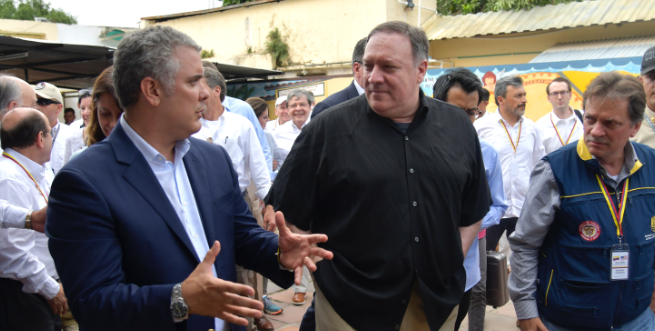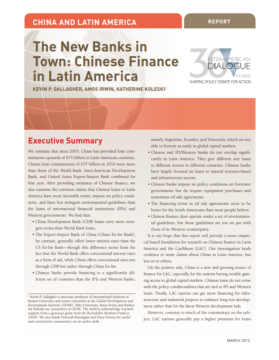Hugo Stay Home
Hugo Chavez, the Venezuelan president, has clearly been enticed by the Libyan drama, where his longtime friend and ally, Muammar al-Qaddafi, is under siege from rebel forces.
A Daily Publication of The Dialogue
U.S. Secretary of State Mike Pompeo this month made a four-day visit to Latin America, with stops in Chile, Paraguay, Peru and Colombia. During the trip, Pompeo reiterated the Trump administration’s call for a political transition in Venezuela. What did Pompeo accomplish on the trip? Is Washington’s push to end Venezuelan President Nicolás Maduro’s rule working? Should the Trump administration be doing more to help Venezuelan migrants who have sought refuge in the United States?
Ray Walser, retired U.S. Foreign Service officer and former Latin American policy analyst at the Heritage Foundation:“The brief South American circuit ride by Secretary Pompeo occurred almost three months after the United States, the Lima Group and dozens of other nations recognized National Assembly President Juan Guaidó as Venezuela’s legitimate president. Pompeo undertook the trip to reinforce diplomatic support for Guaidó and for a policy of maximum political and economic pressure aimed at forcing Nicolás Maduro to step aside and open a pathway to a democratic transition. According to press accounts, the backing of all four countries remains solid. In addition to a symbolic visit to the Colombia-Venezuela border, Pompeo most likely solicited fresh ideas for peaceful means to unseat Maduro as frustrations mount over an unsustainable standoff in a failing Venezuela. The secretary firmly rejected suggestions that U.S. sanctions are contributing to the humanitarian crisis, saying ‘a hundred percent of the refugee challenge … is the direct result of the Russians, the Cubans and Nicolás Maduro.’ With the Venezuelan military showing no imminent signs of turning against Maduro, senior administration officials—Pompeo in Latin America, Vice President Pence at the United Nations, special envoy Elliott Abrams in Washington along with National Security Advisor John Bolton—seek additional means short of military intervention to end the Venezuelan nightmare. Bolton’s speech to Bay of Pigs veterans on Wednesday unveiled additional measures aimed at weakening Cuban support for Maduro. In dealing with Latin American refugees in the United States, the Trump administration treads a fine line, including questions of moral disparity, between a hardline stance on Central American border crossers, refugees and asylum seekers and presumed sympathy for the plight of Venezuelans fleeing repression, crime and poverty at home. Temporary Protected Status for Venezuelans has earned bipartisan support but remains lodged on the congressional agenda.”
Geoff Ramsey, assistant director for Venezuela at the Washington Office on Latin
America: “Secretary Pompeo’s trip served as a reminder of the failure of the Trump administration’s strategy on Venezuela, and there are signs of cracks in regional support for U.S. policy. Privately, Latin American diplomats are growing annoyed by their U.S. counterparts consistently turning the conversation to Venezuela—even in meetings that begin on unrelated topics. The Chilean government’s subtle shift in recent days has been a clear sign of this dynamic. While Chilean President Sebastián Piñera remains an active participant in the Lima Group, he has recently embraced the International Contact Group (ICG). The ICG, which Washington does not view particularly favorably, has an explicit mandate to pursue separate negotiations with both Maduro and the opposition in pursuit of free and fair elections. After sending a representative to the ICG’s March 28 meeting in Quito, Piñera has called for ‘greater unity’ with the ICG mission. This, paired with the Lima Group’s continued reluctance to follow the United States in implementing sanctions and its outright condemnation of a ‘military option,’ is a sign that Latin America’s patience for U.S.-Venezuela policy is thinning. More urgent, for Latin American governments, is addressing the needs of the 3.7 million Venezuelans who have fled their country. However, after rolling out new promises of regional aid for displaced Venezuelans on a near monthly basis in 2018, the Trump administration has grown noticeably silent on the issue. If the White House wants to continue to enjoy the support of Latin American governments, it will have to show renewed commitment to funding the regional response to this exodus.”
Francisco Durand, professor of political science at the Catholic University of Peru: “I hate Maduro but I do not like American intervention in Venezuela,’ a Venezuelan immigrant in Peru told me when the ‘humanitarian crisis’ started. The opinion summarizes well the predominant state of opinion in Latin America at a moment the U.S. offensive has lost momentum and any hint of intervention is silently opposed by many countries, the Brazilian military in particular, a crucial player if the military intervention card crystalizes. Let’s not forget that no Latin American country has ever invaded another to provoke regime change. Pompeo’s trip is an attempt to keep the Lima Group alive at a moment that another front is opening in Peru and Colombia, the main recipients of more than three million Venezuelan migrants whose presence exerts tremendous pressure on the poor and the
underpaid, the ones being displaced by super cheap labor from Venezuela. So there are two problems that will worsen as time passes, one in Venezuela (where Maduro survives but feels the brunt of the economic oil revenue embargo) and those who accept the Venezuelan migrants. Pompeo’s $30 million offer to Peru (which has 740,000 Venezuelan migrants) is an indication that the United States is trying new ways to keep the front united. In the meantime, Guaidó’s ‘no dialogue’ position results in him losing support, and the Mexican and Uruguayan proposal to start a dialogue (that will give Maduro extra time) seems now more attractive than before. The crisis is just beginning.”
Brian Turner, chair of the Department of Political Science at Randolph-Macon College: “Secretary Pompeo’s visit to Paraguay was clearly a reward to the country for having not only recognized Juan Guaidó as interim president of Venezuela but also having cut diplomatic ties with Caracas. Foreign Minister Luis Castiglioni referred to the visit as ‘strong backing,’ and reportedly President Mario Abdo Benítez will meet with President Trump this summer. When the press asked Castiglioni if Paraguay would support military intervention in Venezuela, he said ‘It’s going to be the Venezuelans themselves … who will really liberate their country from tyranny, with the cooperation and help of the U.S., of Paraguay and all the other countries in the world.’ Castiglioni denied to local press that Pompeo had made any request for Paraguayan support for an eventual military intervention in Venezuela, but did not answer questions about whether Paraguay would support this. Pompeo also praised Paraguay’s ‘warm relations’ (and diplomatic recognition) with Taiwan and warned against Beijing’s ‘predatory practices.’ Pompeo pressed Paraguay on fighting criminal and terrorist activity in the Tri-Border region, and improving transparency and fighting corruption. Pompeo said Paraguay has made good efforts but ‘there is much work still to be done’ to address concerns about money laundering and support for Hezbollah in the Tri-Border region. Not mentioned in public documents was any discussion by Pompeo about Abdo’s reversal of his predecessor Horacio Cartes’ move of the embassy in Israel to Jerusalem, or accusations surrounding people close to Cartes of smuggling and money laundering. This visit took place the same week that Abdo and Cartes negotiated a political pact between their factions of the ruling Colorado Party.”
Maria Velez de Berliner, managing director of RTG-Red Team Group, Inc.: “The exigencies of Trump’s re-election will drive U.S. action on Venezuela. Nothing the United States, Juan Guaidó or Colombia have done has dislodged Maduro and his military. As Venezuelans’ struggle for survival increases, Guaidó’s shine dims. It seems no one has yet devised a reality-based plan that responds to what plan B is if Maduro doesn’t leave and who can effectively unite, govern and rebuild a bankrupt and politically riven Venezuela. Short of a direct military intervention, it seems U.S. nonmilitary options decrease as Maduro remains in power. Let’s not overlook that Russia, Cuba, Iran, China and Turkey, embedded in Venezuela’s military, intelligence and what remains of a national economy, count heavily when considering any U.S. military option. What Trump’s administration and Latin America does not need is a Venezuelan internecine war that turns into a regional conflict involving exogenous adversaries of the United States. The solution to Venezuela rests on in-country Venezuelans alone. Trump’s threatened military intervention will not restore Venezuela to pre-Chávez/Maduro times. Maduro still has powerful supporters within the high ranks of Venezuela’s military, his Colectivos and Militias Bolivarianas, and those who have become criminally wealthy during Chávez’s and Maduro’s regimes. Rather than threats, the Trump administration should be negotiating a satisfactory exit for Diosdado Cabello and Vladimir Padrino. Maduro will leave with them, hopefully without a bloodbath in Venezuela. Trump’s expected military intervention will help neither Guaidó, who cannot afford to be seen as the ‘U.S. Man in Venezuela’ nor the face of current or future policies of the United States in Latin America.”
The Latin America Advisor features Q&A with leaders in politics, economics, and finance every business day. The publication is available to members of the Dialogue's Corporate Program and others by subscription.
Hugo Chavez, the Venezuelan president, has clearly been enticed by the Libyan drama, where his longtime friend and ally, Muammar al-Qaddafi, is under siege from rebel forces.
Estimates of the volume, composition, and characteristics of Chinese lending to the region since 2005.
Is the Venezuelan government likely to comply with the IACHR’s ruling or will it uphold the ban?
 Photo: Colombian Government
Photo: Colombian Government
